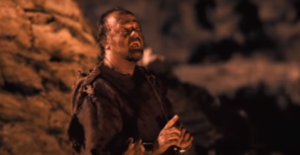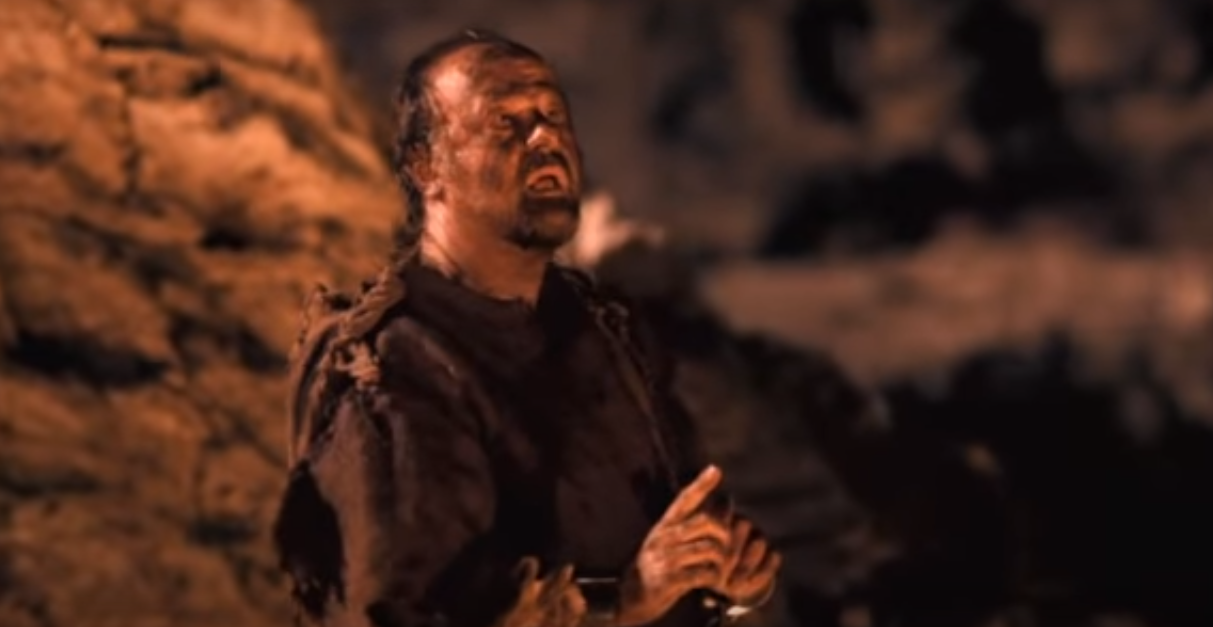…and he looked up and saw something different. He saw someone, like a Son of Man, talking with Lazarus and the rest…

The man wept.
His hands, once soft and perfumed, now bore the calluses of crawling. Crawling—across a land not made for the living or the dead. Just souls and ash and heat. Every breath burned. Smoke and sulfur clung to his lungs like punishment, making it impossible to remember what clean air even felt like.
Tears had long since become his drink.
The ground beneath him—uneven, scorched, stony—was his eternal mattress. And his robe? The fine purple he once wore to dinner parties had burned away long ago. He hardly noticed. The only thing he felt now was the weight of memory, and that… that cut deeper than the rocks ever could.
He heard it again—Father Abraham’s voice. It echoed, not from the air, but from within his soul.
“Son, remember that thou in thy lifetime receivedst thy good things…”
He remembered.
He remembered every feast, every ignored beggar, every half-smile given to someone beneath him. He remembered Lazarus. And he remembered the sick, sinking feeling of watching Paradise from afar—so close he could name the colors, so far he could never touch them.
He groaned and dragged himself forward, not because he hoped to arrive anywhere… but because torment has a rhythm. Even stillness was a form of suffering here.
Then, he saw him.
A man—standing tall, untouched by soot or flame. No burns. No blisters. No cuts. Just shock on his face, the kind of look you wear when death arrives before you expect it.
Strange, the rich man thought. Still so clean. So new.
“Hey,” he rasped, coughing through the fire in his throat. “You—do you know me? Maybe you came to one of my parties once? Maybe we did business?”
His voice, cracked and scorched, reached out like a beggar’s hand.
The newcomer shook his head. “No. I was a thief.”
The man laughed—a dry, bitter sound. “Ah, the Romans got you, huh? Holes in the hands? Yeah, they always leave a mark.”
But the thief wasn’t smiling. He glanced around, searching—panicked.
“They… they should be here too. I wasn’t alone. There were two of us—crucified.”His voice faltered.
“Where are they?”
The rich man blinked. “Plenty of space here. Trust me. More arrive every day—if you can even call it a day. Were they like you? Larcenists?”
The thief shook his head. “No. One of them… He said He was a King. He said… today we’d be in Paradise.”
That word.
Paradise.
It pierced through the smoke like a beam of memory.
The rich man’s head lifted slowly, painfully. His neck cracked, unused to hope. The word stirred something ancient in him, something he hadn’t felt since… well, since he first laid eyes on Lazarus across that great gulf.
In the distance, where Paradise shimmered like a precious gem, he noticed movement.
Someone stood in radiant light, speaking to Lazarus and a host of others. Familiar faces. David. Isaiah. Moses. And Abraham. All gathered, not around the fire, but around Him.
The Son of Man.
And the words He spoke… they weren’t mere words. They danced on light.They sang.
“It is finished.”
Lazarus sang. The crowd sang. It was joy—a joy that couldn’t be imitated, only shared.
And everyone in Sheol could hear it.
The rich man. The thief. All the souls in flame and smoke—they heard. And they knew.
They were not included.
Their weeping wasn’t from the heat. It came from knowing they missed the moment. The moment when death lost its power. When mercy came down and walked away with the faithful.
Then… Paradise disappeared.
Gone.
Not faded—taken. Removed like a curtain pulled back. Those who had once been seen were now gone. Where they went, no one could say. But every soul left behind knew: they would never go there. Not like that. Not in joy.
The thief’s face twisted in grief. “I mocked Him,” he whispered. “I mocked the King.”
And the rich man? He looked down at his soot-stained body. He thought of purple robes, gold rings, and empty prayers. He’d worn the finest clothes on Earth—but had come here naked in truth.
And then—light.
The same light from Paradise descended upon Sheol. Jesus.But now His glory did not gather saints. It revealed judgment.
He looked at them—not with wrath, but with sorrow. A compassion that made the pain worse.
And then He said it.
“Your story… will not be remembered as glory. It will be remembered as a warning.”
…The rich man dropped his eyes again. The light dimmed.
The songs of victory faded. Screams returned, louder, harsher, like an orchestra of despair. Sheol wept for what had been taken from them—not just people, but possibility.
Then something changed.
Where there had been sobbing—there was now snarling.Where sorrow once ruled—rage now took its throne.
Voices—twisted by years of pride and rebellion—rose in furious howls.Gnashing teeth replaced weeping eyes. Fists slammed into the stony ground. Some clawed at the walls. Others cursed the names of prophets they once quoted but never followed.
“Why Him and not us?” “Why them and not me?”
The cries of regret twisted into accusations.Against Abraham. Against Lazarus.Against the King Himself.
Some shouted at the darkness as if they could drag back the light.Others tore at themselves, angry not just at judgment—but at the mercy they now despised because it was no longer available.
The thief dropped to his knees and wept again.But this time, he didn’t weep alone.
He wept surrounded by the gnashing.The awful sound of those who now hated the grace they had once ignored.
And in that moment, the rich man understood something he never had before:Hell is not merely the absence of God’s presence.It is the rejection of it.
Even when the Son of God came down, shining and singing…They chose the shadows.
And now, the shadows were all they had left.
Scripture used for this story:
- Luke 16:25
- Luke 16:27-28
- Luke 23:43
- Ephesians 4:8-10
- Luke 16:26
- John 19:30
- Romans 2:4
- Hebrews 9:27
- Revelation 20:11-16
- Ephesians 4:8
- Revelation 20:12-13)
- Revelation 20:14
- Revelation 3:17-18
- Luke 16:29
- 1 Peter 3:18-20
- Revelation 20:11-15




